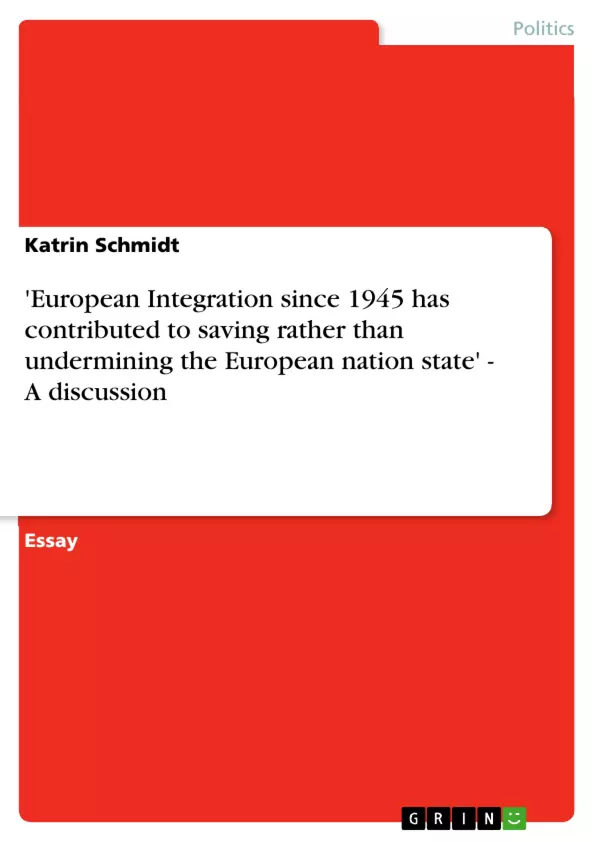European integration has been undergoing a special development recently. 2005 has been a decisive year for the future of the European Union and its member states. The draft of the Constitutional Treaty due to be ratified by the European member states has not been accepted by the Dutch and the French people. What impact do those decisions have on the European nation state? Do they state that European integration has saved the nation state implying that there will be no future federal European state? In what way has European integration undermined the nation state since 1945?
Inhaltsverzeichnis (Table of Contents)
- Power and Decision-making in the European Union
- The Nation State
- Post-World War II Situation
- The ECSC, EURATOM and the EEC
- European Integration and Economic Growth
- The Nation State Regains Power
- European Enlargements
- German Unification and Interdependence
- The Maastricht Treaty
- The Treaty of Amsterdam
Zielsetzung und Themenschwerpunkte (Objectives and Key Themes)
This paper discusses the relationship between European integration and the nation state since 1945, focusing on the argument that European integration has contributed to the preservation, rather than the undermining, of the European nation state.
- The impact of European integration on the nation state
- The role of economic factors in European integration
- The historical context of European integration
- The evolving relationship between national identity and European citizenship
- The challenges and opportunities of European integration
Zusammenfassung der Kapitel (Chapter Summaries)
- The paper begins by defining the nation state and outlining the challenging situation faced by European nation states in the aftermath of World War II.
- It then examines the emergence of the European Coal and Steel Community (ECSC), the European Atomic Energy Community (EURATOM), and the European Economic Community (EEC), highlighting the gradual transfer of sovereignty from nation states to supranational institutions.
- The paper explores the relationship between economic growth and European integration, suggesting that periods of economic prosperity tend to accelerate the integration process, while recessions lead to a strengthening of national focus.
- The paper discusses the various enlargements of the European Union, including the addition of Greece, Portugal, and Spain, and the significance of German reunification in shaping the integration process.
- The paper examines the Maastricht Treaty and its establishment of the Common Foreign and Security Policy (CFSP) and the Euro, highlighting the tension between intergovernmental and supranational approaches to European integration.
- The paper concludes by analyzing the Treaty of Amsterdam, its emphasis on European citizenship, and the ongoing debate about the relationship between national and European identities.
Schlüsselwörter (Keywords)
This paper examines key concepts such as European integration, nation state, sovereignty, economic interdependence, Europeanization, supranationalism, intergovernmentalism, and the European Union.
Frequently Asked Questions
Did European integration undermine the nation state?
The paper discusses the argument that integration actually saved the nation state by providing a framework for economic growth and stability after WWII.
What was the significance of the 2005 Constitutional Treaty referendums?
The rejection of the treaty by French and Dutch voters highlighted the resilience of national identity and concerns about losing sovereignty to a federal European state.
How did the ECSC and EEC impact sovereignty?
These communities initiated a gradual transfer of specific sovereign rights to supranational institutions, primarily in economic and industrial sectors.
What role did German unification play in European integration?
German unification increased interdependence and accelerated the push for political and monetary union (Maastricht Treaty) to ensure a stable European framework.
What is the difference between intergovernmentalism and supranationalism?
Intergovernmentalism focuses on cooperation between sovereign states, while supranationalism involves shifting power to institutions above the national level.
- Quote paper
- Katrin Schmidt (Author), 2005, 'European Integration since 1945 has contributed to saving rather than undermining the European nation state' - A discussion, Munich, GRIN Verlag, https://www.grin.com/document/94221



